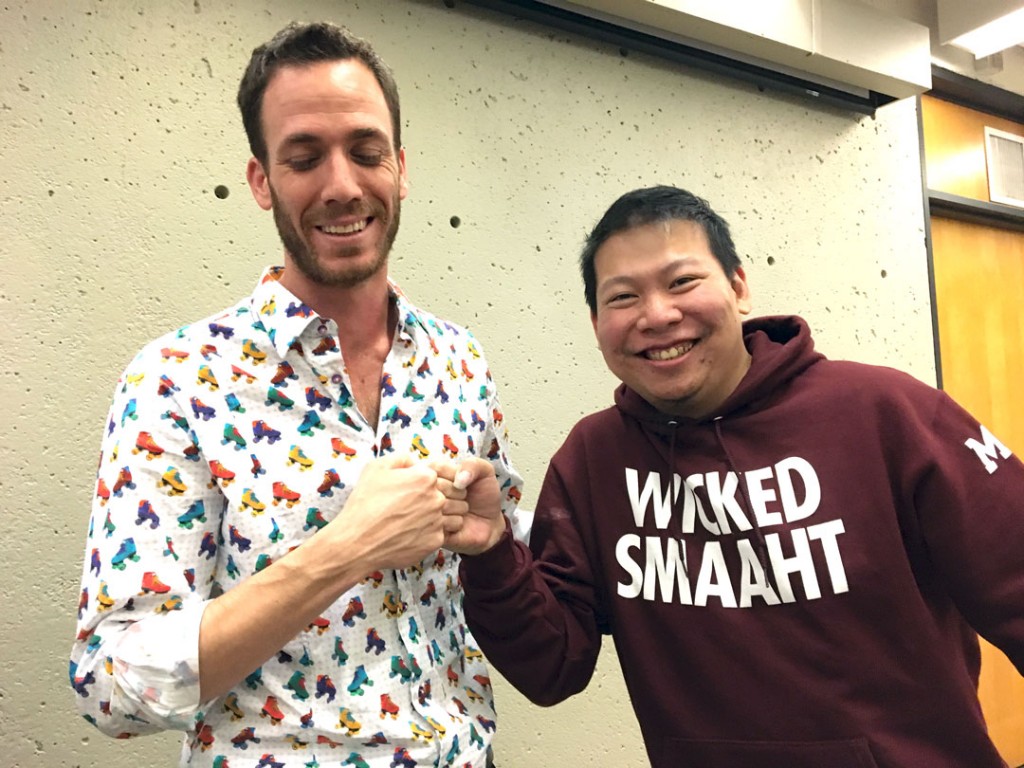While silence is deafening, signs of the times call on people, especially teachers and educators, to speak up.
It’s been some time since I last wrote an article on this blog. Swamped would be an understatement. Thus, I thought that in the middle of it all, it might be good to write something here.

Social media, as well as other media, have recently been flooded with a lot of very colorful input, output, insights, comments and outtakes, mostly, surrounding the elections both in the Philippines as well as in the United States. Overnight analysts continue to contribute to the buzz, and yes, this article included.
To demonstrate the ripple effect that certain actions and social buzz create, I offer the following image. This greeted me when I opened the Yahoo! homepage in the US yesterday morning:

I recognize that Yahoo! customizes its homepage based on data it receives as our interests regardless of whether we are signed in or not. However, the fact remains that these are readily available, syndicated from multiple sources, and can instantly be displayed should we or our friends click on or react to certain links and content.
Our seemingly minuscule actions in what we might perceive to be matters in our small villages have global effects. Physical and social phenomena, including the elections, are often simulated and modeled using physics and math. In physics and math, there’s a concept in chaos theory called the butterfly effect. This might be a social example of that.
In the analysis of the social spectrum, we don’t just look at the physical existence of things but their social aspects as well — eg. not just actions but also words. While the 19th Century children’s rhyme goes “Sticks and stones will break my bones, But words will never harm me.“, we see the massive effects of words this season. With the pervasiveness of devices, we now even download photos and videos into our consciousness where words come alive, and whether we like it or not, they are set on replay.
Last week, the renowned TEDx speaker Rav Gavrieli from Tel Aviv University gave a talk at the Harvard Graduate School of Education. Rav is mostly known as the guy who very publicly verbalized why he stopped watching porn. With roughly 12 million views to his initial talk to date, it is the 3rd most viewed TEDx talk on YouTube.
Introducing Ran was Diane Rosenfeld, a Lecturer at the Harvard Law School. In her introduction, she mentioned that 31% of Harvard College females get harassed in one form or another, before they graduate from undergraduate studies. This statistic, to me, is appalling. If it can happen or is happening at that rate in what’s considered the top university in the U.S., what more in other places?
What’s even more interesting is that there’s evidence that suggests that porn contributes to the aggressive behavior that leads to misconduct by those who consume it; especially school-aged youth. Both Diane and Ran stated that the average age that kids start to encounter and sometimes get immersed in porn is 11. Roughly 50% of kids in the US who are aged 10-17 watch and consume porn. For kids who first encounter porn and use it as a baseline to define normal, evidence shows that these lead to developmental issues. Diane provided more specific insights and citations to this, while Ran showed this as per his talk above, and further elaborated upon these in his talk at HGSE.
When Ran started speaking, he spoke about how he, who considers himself as common folk, is contacted by a huge number of people, mostly those who have been abused or harassed, seeking help. I suppose this happens when you have a popular TEDx talk around gender sensitivity and protection of rights. As he does not consider himself to be one who can professionally help these folks, he handholds them to those who can.
I think there’s heroism in that.

What’s even more important, in my opinion, are some of the thoughts that Ran shared as to what we can and should do in response to the threat posed by demented ideas, as catalyzed by porn, especially for the youth.
As Ran was speaking with an audience mostly composed of HGSE students including yours truly, he outlined some thoughts.
First, we must educate for social justice. There is primacy in why we educate and what the purpose of an education is. And that is to teach for social justice. To teach everyone to strive for what’s just and what’s right, for everyone, at every age.
Second, to do so, we must be in their context. As teachers and educators, we cannot just sit in ivory towers or stand in pulpits and preach. We must be with our students and participate in their context — be it on Facebook, Twitter, or Snapchat.
Third, we need to teach compassion. We need to teach empathy. We need to teach equality. We can’t teach equality if we do not teach compassion and empathy. This reminds me of the design thinking cycle and how we can use its methods such as empathy mapping to try our best to relate to and understand the other.
Fourth, we need to encode our own experiences. As teachers, we are not just facilitators but we also have our own experiences of inequality and injustice. We need to encode these, share these, and give these a voice. That way, we not only get the word out that these things are happening and must be resolved, but that these can serve as models to give a voice to the voiceless, and a face to the faceless.
Fifth, Ran recalled that in Dante’s Inferno, the worst level of hell is reserved for the apathetic and indifferent. Thus, we must take action and be proactive in promoting justice.
While listening to both Ran and Diane, I couldn’t help but relate pornography to the other social issues we face today, especially the uproar and sometimes baffling content that we encounter everyday related to the upcoming elections.
Much like porn, there’s a certain attraction that leads to people taking things face-value and as a matter of fact, hugely based on one’s biases, without even checking if these are facts. As one Jesuit would say, the truthiness of all these have fueled the growth of materials and pieces surrounding what’s considered to be sexy.
But what’s real, what’s true, what’s good and what’s love aren’t always sexy. Perhaps if we stop supporting election porn and do our part in advocating for social justice even in our own, personal ways, we can learn to change the world.
Perhaps if we are able to innovate in these areas like the video below, we can come up with ways to make the world a better place.
![]() This work is licensed under a Creative Commons Attribution 4.0 International License.
This work is licensed under a Creative Commons Attribution 4.0 International License.

